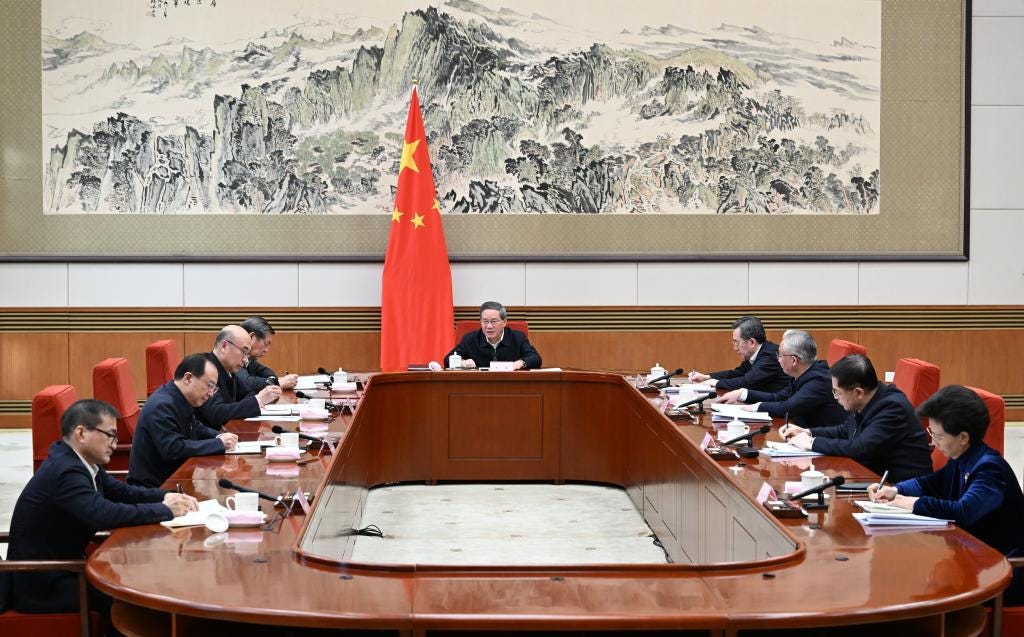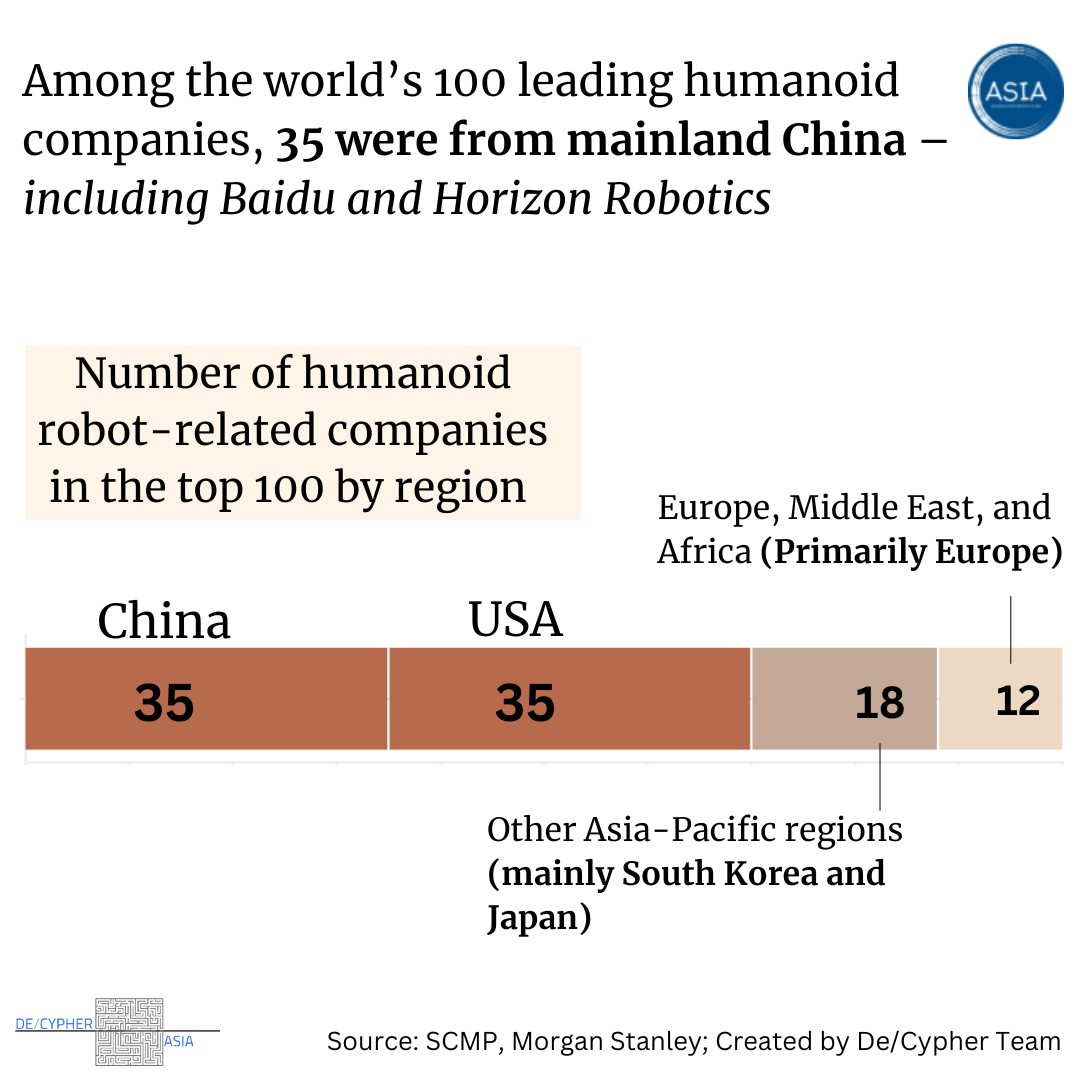China This Week: Jack Ma’s Return, Wang at G20, and Chinese Warships Near Sydney
This week's Beyond the Great Wall provides an overview of key developments within China, along with insights into its foreign affairs.
China Quote 🗩
“The IMF quota realignment is critical for the IMF’s governance, representativeness, and legitimacy. The current quota shares can no longer reflect the actual position of emerging markets in the global economy, which requires the IMF to accelerate its quota realignment reforms,” - Pan Gongsheng, Party Secretary and Governor of the People's Bank of China (PBOC).
Economic Activity🏦
Messages on the Private Sector From Xi’s Meeting With Business Leaders
Zhang Jun writes in Caixin Global that President Xi Jinping’s recent symposium with private business leaders signals strong government backing for the private sector amid the upcoming Private Economy Promotion Law. Xi emphasised technological innovation, regional development, rural revitalisation, and improving livelihoods. The focus has shifted toward tech industries, with expanded support in infrastructure and financing. The anticipated law is set to stabilise markets, encourage innovation, and reassess private enterprise valuations within China’s socialist market economy framework.
Jack Ma Is Back, but Beijing Is in Control
Lizzi C. Lee writes in Foreign Policy that Jack Ma’s reappearance has reignited discussions about Beijing’s stance on the private sector, but Alibaba’s transformation into a key player in China’s AI and cloud ambitions highlights its deeper alignment with state priorities. While Beijing seeks to stabilise private sector confidence, arbitrary crackdowns persist. Alibaba’s AI infrastructure has become indispensable to China’s self-sufficiency goals, but the state’s control remains paramount, with Ma’s subdued return signalling this delicate balance.
Chinese Premier Stresses Boosting Consumption, Expanding Domestic Demand

China Daily reports that Chinese Premier Li Qiang has called for stronger and more targeted measures to boost consumption and improve livelihoods, underscoring consumption’s pivotal role in driving economic growth. At a State Council study session, Li urged policies to expand domestic demand, enhance service consumption, and improve sectors like education, healthcare, tourism, and elderly care. He also advocated accelerating AI applications to unlock new consumer potential, relaxing market access, and diversifying high-quality products to meet evolving demands.
PBOC’s Pan Says Reform of IMF Quota System ‘Critical’
Qing Na writes in Caixin Global that China’s central bank governor, Pan Gongsheng, has called for an urgent reform of the IMF’s quota system to better reflect the economic influence of emerging markets. Speaking at an IMF-Saudi Arabia conference in Al Ula, Pan argued that current quota shares fail to represent emerging economies' global economic roles, stressing that realignment is crucial for the IMF’s governance, representativeness, and legitimacy.
Inside China🐉
PLA Air Force Launches AI-Powered Biometric Screening to Recruit Next Top Guns
Enoch Wong writes in South China Morning Post that the People’s Liberation Army Air Force has integrated AI-driven biometric tests into its 2025 pilot recruitment process to assess candidates’ long-term health risks and human-machine adaptability. The system uses data analytics to interpret biological signals, while human recruiters focus on personality traits, creating a "dual-engine" selection model. The updated process includes over 100 tests, 3D body measurements, and ECG monitoring. AI aids in enhancing precision but raises concerns over biases, echoing similar challenges faced by Western militaries.
China and the World🌏
Wang Yi, Lavrov Discuss Strengthening China-Russia Ties at G20 Meeting

CGTN reports that Chinese Foreign Minister Wang Yi and Russian Foreign Minister Sergei Lavrov met on the sidelines of the G20 Foreign Ministers' Meeting in Johannesburg to reaffirm their strategic partnership. Wang highlighted the advancement of China-Russia ties, emphasizing deeper cooperation and coordination to promote global multipolarity. Lavrov expressed Russia’s commitment to strengthening high-level exchanges and practical cooperation across sectors like trade, finance, and culture, while endorsing China's global initiatives and enhancing collaboration under frameworks like BRICS, SCO, and the UN.
China Backs US-Russia 'Consensus' on Ukraine War
Seb Starcevic writes in Politico that Chinese Foreign Minister Wang Yi expressed support for the recent "consensus" between the US and Russia on ending the war in Ukraine during the G20 foreign ministers' meeting in South Africa. Wang urged a sustainable solution that addresses all parties' concerns and affirmed China’s willingness to play a "constructive role" in peace talks. His remarks follow US-Russia talks in Saudi Arabia—held without Kyiv—raising fears of a deal favouring Moscow. Despite claims of neutrality, China remains a key Russian ally.
UK Appoints New Ambassador to China Amid Efforts to Mend Ties

Kate Holton, Andrew Macaskill, and Joe Cash write in Reuters that Britain is set to appoint Peter Wilson, a Mandarin-speaking diplomat and son of former Hong Kong governor David Wilson, as its new ambassador to China. The move signals a diplomatic reset under the Labour government following strained ties over human rights and security concerns. Wilson, who previously served in Beijing and held senior roles in the Netherlands and Brazil, will replace Caroline Wilson. The appointment coincides with renewed UK-China dialogues and an anticipated visit by Prime Minister Keir Starmer to China later this year.
China and Saudi Arabia Strengthen Strategic Ties Amid G20 Talks
Xinhua reports that Chinese Foreign Minister Wang Yi and Saudi counterpart Faisal bin Farhan Al Saud discussed deepening China-Saudi Arabia relations during the G20 Foreign Ministers' Meeting in Johannesburg. Marking 35 years of diplomatic ties, Wang emphasised expanding cooperation in trade, energy, digital economy, and high-end manufacturing. He praised Saudi Arabia's mediation in regional issues and reaffirmed China’s support for Palestine. Faisal highlighted the importance of the China-Saudi strategic partnership and lauded China's role in promoting Middle East peace, opposing the displacement of Palestinians in Gaza.
China Berates US Over Taiwan Policy Shift
The Guardian reports that China has condemned the US for altering language on its State Department website, removing the statement "We do not support Taiwan independence." Beijing criticised the move as sending "seriously wrong signals" to pro-independence forces and urged the US to "correct its mistakes." While Taiwan welcomed the change, Beijing warned it threatens peace in the Taiwan Strait. The update follows Donald Trump's return to the White House, which has complicated US-Taiwan-China dynamics.
China Urges Ireland to Expand Bilateral Ties, Calls for Equal Relations with EU
Berk Kutay Gokmen writes in Anadolu Agency that Chinese Foreign Minister Wang Yi, during his first official visit to Ireland, called for stronger bilateral ties and advocated for "equal" China-EU relations. Meeting Irish Prime Minister Micheal Martin and Foreign Minister Simon Harris, Wang highlighted the economic benefits Ireland has gained from cooperation with China and emphasized the need for mutual respect and partnership. Marking 50 years of China-EU diplomatic ties, Wang urged both sides to uphold multilateralism, free trade, and avoid unilateralism, before heading to the US for a UN Security Council meeting.
Chinese Warships Sail Close to Sydney, Signalling Power Projection in Pacific
Demetri Sevastopulo and Nic Fildes write in the Financial Times that Australian naval forces are shadowing a Chinese task group, comprising two warships and a supply vessel, sailing 150 nautical miles east of Sydney—marking China’s furthest naval reach down Australia’s east coast. Analysts view the manoeuvre as Beijing's effort to normalise its power projection beyond the Pacific island chains. The deployment highlights growing Chinese influence in the region, raising concerns in Australia and the US. Though the ships remain in international waters, the incident underscores escalating maritime tensions, with Australia closely monitoring Chinese naval activities.
China Expels Philippine Aircraft Near Disputed Spratly Islands
Reuters reports that China’s military warned and expelled three Philippine aircraft for allegedly "illegally intruding" into airspace near the Spratly Islands. Beijing accused Manila of using provocations to promote "illegal claims" in the South China Sea, calling the move "doomed to failure." Despite a 2016 international ruling invalidating China’s vast claims, Beijing refuses to recognise it. The Philippines has not commented on the incident.
How Dirty Money From Fentanyl Sales Is Flowing Through China
Patricia Kowsmann, Dylan Tokar, and Brian Spegele write in The Wall Street Journal that Chinese money brokers are increasingly central to laundering proceeds from U.S. fentanyl sales, facilitating partnerships with Mexican cartels. Using underground banking networks, brokers collect cash from drug sales and channel it to Chinese clients seeking U.S. dollars, bypassing China’s capital controls. This process cleans drug money while meeting Chinese demand for foreign currency. U.S. officials highlight challenges in dismantling this network, which undercuts traditional laundering methods with lower fees and faster transactions. Despite China’s denial of responsibility, U.S. authorities stress the need for deeper cooperation to curb this illicit financial flow.
US Senators Propose Barring Chinese Citizens from National Labs Over Espionage Fears
Bochen Han writes in South China Morning Post that US lawmakers and experts have called for stricter measures to prevent Chinese citizens from accessing American national laboratories, citing concerns over intellectual property theft. During a Senate hearing, former energy undersecretary Paul Dabbar recommended a default ban, while Senator Tom Cotton pushed legislation to restrict citizens from China, Cuba, Iran, North Korea, and Russia unless granted waivers. Lawmakers argue that programs like China’s Thousand Talents scheme exploit US-funded research for Beijing’s military gains. While the Biden administration has expressed concerns over the impact of such bans, Republicans stress heightened risks of espionage at sensitive facilities.
Tech in China🖥️
AstraZeneca Acquires FibroGen’s China Unit for $160M, Gains Roxadustat Rights
James Waldron writes in Fierce Pharma that AstraZeneca has purchased FibroGen’s China business for $160 million, securing regional rights to the anemia drug roxadustat. The deal includes $85 million in enterprise value and $75 million in FibroGen’s Chinese net cash. The acquisition strengthens AstraZeneca’s position in China, where roxadustat is a category leader for chronic kidney disease-related anemia. FibroGen plans to use the proceeds to repay its Morgan Stanley loan and extend its cash runway into 2027. The move comes as AstraZeneca navigates regulatory challenges and seeks growth in the Chinese market.
China Launches First AI Model for Rare Disease Diagnosis

China Daily reports that China has unveiled its first AI large language model dedicated to rare disease diagnosis, PUMCH-GENESIS, developed by Peking Union Medical College Hospital (PUMCH) and the Chinese Academy of Sciences. The AI system streamlines the diagnostic process by identifying potential rare genetic disorders and offering medical recommendations. Tailored to Chinese demographics, the model aims to reduce misdiagnosis and accelerate treatment. Public testing includes preliminary consultations and appointment bookings, with plans to integrate the tool into national rare disease networks.
De/Cypher Data Dive 📊
Chinese tech giants are rapidly investing in humanoid-robot technology to automate factories and homes, replacing human workers. China’s AI sector, led by companies such as Hangzhou-based start-up DeepSeek, has been making rapid progress, which has fuelled growth in the local humanoid-robotics industry.
Recently Ant Group, the Alibaba-linked fintech giant, is venturing into the humanoid robot industry, joining a growing list of major Chinese tech companies exploring this emerging field.
By the end of 2024, the number of enterprises in the smart robot industry in China had reached 451,700.
Image of the Week📸

- - -



